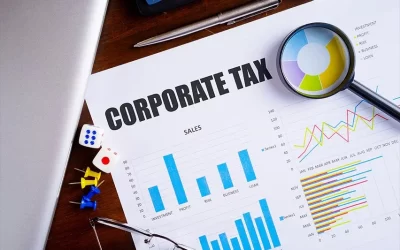MASAR Chartered Accountants is a leading firm in the UAE, offering comprehensive VAT in UAE services to help businesses navigate the intricacies of this tax system. The United Arab Emirates (UAE) implemented a federal Value Added Tax (VAT) system on January 1, 2018. This significant tax reform has impacted businesses of all sizes, from multinational corporations to small and medium enterprises (SMEs). To ensure compliance with the complex VAT regulations, businesses often seek expert guidance and support.
VAT in UAE
Value Added VAT in UAE is an indirect tax levied on the supply of a wide range of goods and services. It operates by being charged at various stages of the supply chain, from production to distribution, until it reaches the final consumer. While businesses are responsible for collecting and accounting for this tax, it’s important to note that the ultimate burden of the tax falls upon the end consumer. This means that businesses effectively act as intermediaries, collecting the tax on behalf of the government. VAT services in UAE play a pivotal role in guiding businesses through the intricacies of VAT compliance, ensuring accurate tax collection, reporting, and remittance. These services assist companies in navigating the complexities of VAT regulations, ultimately contributing to a smooth and compliant business operation in the UAE’s tax framework.
- An indirect tax Imposed on the Supply of most Goods and Services.
- Charged at each Step of the Supply chain,
- The end consumer ultimately bears the costs.
- Business collects and accounts for the tax.
- In effect, Businesses will be collecting the tax on behalf of the Government.
Why is the UAE Implementing VAT?
The UAE Provides Its citizens and residents with various High-quality public services, including Hospitals, roads, public schools, parks, and civil services. These services are paid for by the government.
VAT in UAE will provide the country with a new source of income, which will ensure the continued provision of high-quality public services in the future. It will also help the government achieve its vision of reducing dependence on oil and building a sustainable knowledge economy for the future.
The implementation of Value Added Tax (VAT) in the UAE serves as a strategic move to diversify the country’s revenue sources and reduce its reliance on oil revenue. This shift allows the UAE to fund its developmental initiatives and provide high-quality public services to its citizens and residents. VAT registration in UAE is a crucial step for businesses operating in the country, as it ensures compliance with the taxation framework and enables them to contribute to the nation’s growth while navigating the intricacies of VAT regulations. By registering for VAT in the UAE, businesses actively participate in the government’s efforts to create a more sustainable and economically resilient future.
Which Sectors are Subject to VAT?
VAT in UAE is levied on the supply of all goods and services. Including Food, Commercial buildings, and Hotel services. If no explicit provision is made to impose a zero rate or an Exemption.
Various sectors in the UAE are subject to Value Added Tax (VAT), a pivotal aspect of the country’s economic framework. Sectors such as retail, hospitality, real estate, and professional services fall within the scope of VAT. It’s essential for businesses operating in these sectors to ensure compliance with VAT regulations, avoid penalties, and maintain smooth operations. VAT consultants in UAE offer specialized guidance to navigate the complexities of VAT implementation. Aiding businesses in understanding their tax obligations, optimizing their processes, and ensuring accurate VAT reporting. These consultants play a crucial role in helping businesses across different sectors adapt to VAT requirements. Fostering financial transparency and compliance within the dynamic tax landscape of the UAE.
What is the Difference between Exempt Supplies and Zero-rated Supplies?
Businesses that supply goods or services that are subject to a zero rate are required to register for VAT. But can recover the VAT in UAE that they incurred on their purchases.
Meanwhile, businesses that supply tax-exempt goods or services cannot recover the VAT they incurred on their purchases.
The mandatory registration limit and the voluntary registration limit
- A business must register for VAT if its taxable supplies and imports exceed the mandatory registration threshold of AED 375,000.
- A business may choose to register for VAT voluntarily if their supplies and imports are below the mandatory registration threshold of AED 187,500.
- Similarly, A business may register voluntarily if its expenses exceed the voluntary registration threshold.
In the context of UAE’s Value Added Tax (VAT), there are two important registration thresholds. The mandatory registration limit requires businesses with an annual turnover exceeding a certain threshold to register for VAT. On the other hand, businesses with turnovers below this limit have the option of voluntary registration. VAT in UAE services offer expert assistance to businesses. Ensuring they correctly assess their turnover, determine their registration status. And meet the necessary obligations in line with the UAE’s VAT regulations.
Are there Specific dates for Businesses to Register for VAT?
All Businesses must apply for registration as soon as possible, to avoid the risk of non-registration by January 1, 2018. Which would entail fines as stipulated in Cabinet Decision no. (40) of 2017 on Administrative Penalties for violations of tax laws in the UAE.
How to Register for VAT?
Tax Registration can be done through the Federal Tax Authority’s website, Registering for VAT in the UAE is a precise process that can be effectively navigated with the assistance of tax agencies. These agencies provide expert guidance, aiding businesses in compiling the necessary documentation, submitting accurate applications, and meeting registration requirements. With their in-depth knowledge of the UAE’s VAT regulations, tax agencies streamline the registration process. Ensuring businesses adhere to legal guidelines and successfully complete their VAT registration.
Will there be Tax Grouping?
Businesses that satisfy certain requirements covered under the legislation (such as having a place of residence in the UAE and being related/associated parties). Will be able to register as a Tax group. For more businesses, Tax grouping will be a useful tool that would simplify accounting for VAT in UAE.
MASAR can help you
MASAR is your trusted partner for VAT in UAE services. Our expert team is dedicated to simplifying the complexities of VAT regulations, ensuring your business’s seamless compliance. We offer comprehensive assistance in VAT registration, helping you navigate the mandatory and voluntary thresholds while meeting specific registration dates. With our guidance, you can distinguish between exempt and zero-rated supplies, optimizing your tax strategy. MASAR also provides insights into tax grouping, helping you make informed decisions. Count on us to help you maintain meticulous records and ensure accurate reporting. And a smooth VAT experience in the UAE’s evolving tax landscape.
You can contact by:









0 Comments